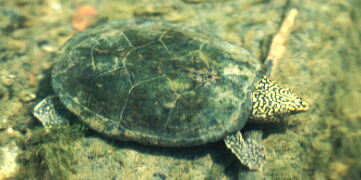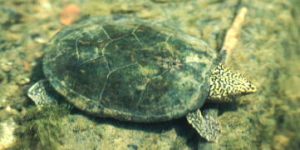
At the Freshwater Land Trust, we protect more than just water and land; we protect many different species: plants and animals alike. In our 20th year, we are recognizing 20 species that we have protected and continue to protect today. One of those species is the flattened musk turtle.

The flattened musk turtle (Sternotherus depressus) is a small freshwater turtle that is rarely larger than 11 cm or 4.3 inches in size. The species is endemic to Alabama and restricted to the upper Black Warrior River Basin in west-central Alabama. According to the U.S. Fish and Wildlife Service, the flattened musk turtle is a threatened species of high conservation concern. They are yellow brown to dark brown with small black spots or streaks with a relatively flat dorsum.
Flattened musk turtles thrive in medium-sized creeks to larger streams with clean water and submerged boulders and rocks with crevices. They are shy bottom dwellers that seldom bask. Females lay two clutches of eggs per year once they’ve reached maturity (six to eight years) with clutch sizes ranging from one to four eggs. Their average life span is 40-60 years.
The primary predator of adult flattened musk turtles are raccoons. Large snapping turtles are also predators of both adult and juvenile flattened musk turtles. The other major threat to the lives of flattened musk turtles is the degradation of its waterways by silt and pollution caused by runoff from mining, industrial, residential, agricultural and logging concerns. This runoff can be toxic to the turtles by eroding their shells as well as killing their prey and making them more susceptible to disease.
The Freshwater Land Trust is committed to protecting precious species such as the flattened musk turtle.
